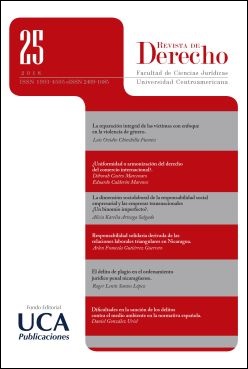Plagiarism in the Nicaraguan legal and criminal code
DOI:
https://doi.org/10.5377/derecho.v0i25.7423Abstract
Plagiarism constitutes one of the greatest violations of copyright. This conduct infringes not only moral rights, but also patrimonial rights. Its criminal regulation is of particular interest not only for the legal rights that it protects, but also for the complexities that such protection implies given the interrelation that exists with other distinctive elements of copyright such as the criterion of originality, and the recognition of limitations in the exercise of rights as is the right of appointment.
The general objective of this article is to analyze the legal regulation of plagiarism in the Nicaraguan Penal Code. It is divided into two parts, the first aimed at systematizing the assumptions of plagiarism behavior, from establishing the theoretical treatment that exists in relation to this, and a second part, which determines the constituent elements of the crime of plagiarism and a legal regulation for this crime is proposed in the Nicaraguan legal system. For its development research methods such as analysis, synthesis, induction and deduction, theoretical-juridical and exegetical analytical were used.
Downloads
1593
Downloads
Published
How to Cite
Issue
Section
License
© Copyright Universidad Centroamericana (UCA)
The author undertakes not to submit any article to any other journal or publication simultaneously.The content of the research article is the sole responsibility of the author, as a result, the Law Journal is released from any responsibility derived from the content of the work.
The author assigns the Revista de Derecho, the right to publish the article, distribute it and market it in the way he considers convenient, nationally and internationally, in printed and electronic format;as well as its inclusion in directories, bibliographic bases and international indexes.

This work is licensed under a licencia de Creative Commons Reconocimiento-NoComercial-CompartirIgual 4.0.




